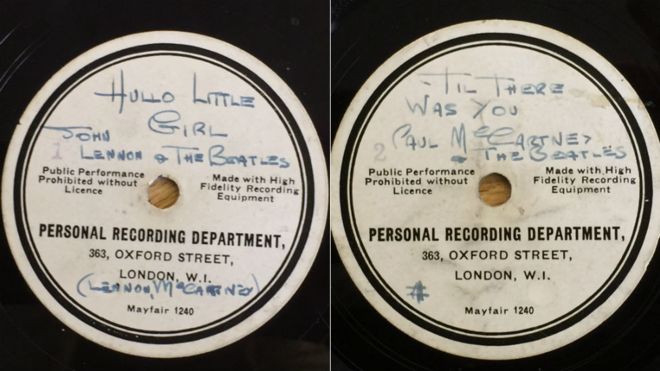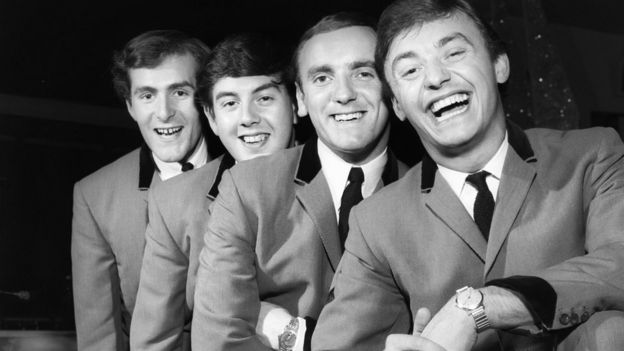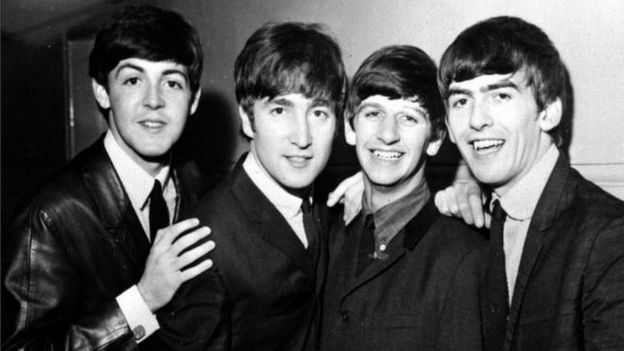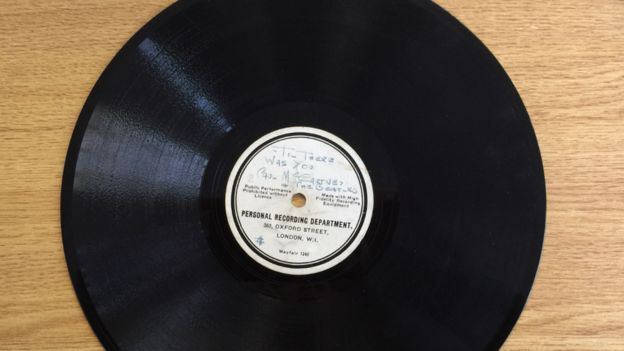'Holy Grail' Beatles record to be auctioned
BBC NEWS
26 February 2016

The 78 RPM record was the first Beatles disc to be cut
An extremely rare and valuable Beatles record that was found languishing in a loft is to be auctioned next month.
Described as "a Holy Grail item", the 1962 10-inch record of Till There Was You and Hello Little Girl lay forgotten in the home of Les Maguire for decades.
Maguire, the keyboardist in fellow Liverpool act Gerry and the Pacemakers, said it could be seen as the record "that sparked The Beatles' success".
The acetate bears the handwriting of the Fab Four's manager Brian Epstein.
'One-off'
A conservative estimate is that the 78 RPM record - the first Beatles disc to be cut before the band broke through into the national charts in late 1962 - will fetch upwards of £10,000 when it is auctioned, although it is such a rare item it is difficult to predict what the sale price will be.
The record of Till There was You - mislabelled by Epstein as 'Til There was You and described as being the work of "Paul McCartney & The Beatles" - was made at the HMV store in Oxford Street, London.
It was presented to future Beatles producer George Martin at the EMI record label in a bid to secure the band a recording contract.
Hello Little Girl, on the other side, which was again mislabelled by Epstein - as Hullo Little Girl - was described as being the work of "John Lennon & The Beatles".
Maguire, 74, of Formby, Merseyside, was given the disc by Epstein in 1963 after it had been returned to him by Martin.

The record was kept in the loft of the home of Les Maguire (far left) for more than 50 years
Maguire described the record as "a special piece" and "a one-off".
"I've never been a big fan of memorabilia, but people seem to like it," he said.
"It's no good to me so I've given it to my granddaughter, who is hoping to buy a house after passing her accountancy exams. I hope it goes for a good price."
The record is being sold for the first time, having been locked away in Maguire's loft, carefully wrapped in paper, for more than 50 years.

The Beatles went on to record 17 UK number one singles
Beatles historian Mark Lewisohn said in his book, Tune In, that the uniqueness of the disc is "enhanced by Brian Epstein's handwriting on the labels, and the recognition of what it led to".
Despite initial reticence from Martin, The Beatles would sign to EMI in 1962 before going on to become one of the most successful and influential bands of all time.
The recording is, Lewisohn wrote, one of the "rarest and most collectable of all Beatles records".
Ian Shirley, editor of Record Collector Rare Record Price Guide, described the disc as a "Holy Grail item".

Till There Was You was written by Meredith Willson in 1957
He said it would "fascinate Beatles collectors worldwide" and would "no doubt attract bids from those with deep pockets".
The sale is to take place at Omega Auctions in Warrington on 22 March and will be broadcast live online for worldwide bidding.
www.omegaauctions.co.uk
The Beatles Auction 2016
Tuesday 22nd March 2016: The Beatles Collection
Venue: Warrington Auction Room
Viewing: Monday 21st March 11.00am - 6.00pm
Viewing: Tuesday 22nd March 9.00am - 12.00pm
Fianl closing date for entries: 4th March
We have some fabulous items in this sale including the 'holy grail' demo record as reported on BBC:
THE RECORD THAT LAUNCHED THE BEATLES

One of the rarest and most collectable of all Beatles records is expected to sell for over £10,000 when it comes up for sale next month. The unique ten-inch 78RPM acetate record featuring ‘Hello Little Girl’ on one side and ‘Till There Was You’ on the other was cut at the HMV record store on Oxford St London before being presented by the group’s manager Brian Epstein to George Martin (EMI) in his desperate attempt to get them a recording contract. This meeting, despite Martin’s initial reticence, was to eventually lead to the breakthrough they were looking for.
In his book Tune In, the leading Beatles historian Mark Lewisohn said of the disc, ‘Its uniqueness is enhanced by Brian Epstein’s handwriting on the labels, and the recognition of what it led to – making it one of the rarest and most collectable of all Beatles records.’
According to Ian Shirley, Record Collector Rare Record Price Guide Editor “This is one of those Holy Grail items like the original Quarrymen acetate that the band recorded themselves. This acetate is a unique item that, in many respects, helped Brain Epstein to start the ball rolling to musical world domination. It will fascinate Beatles collectors worldwide and no doubt attract bids from those with deep pockets.”
The record is being sold by Omega Auctions of Warrington on behalf of Les Maguire of Gerry and the Pacemakers. He was given it by Brian Epstein in 1963 after the disc had been returned to him by George Martin. This is the first time it has come to the marketplace, having been locked away in Maguire’s loft until now.
Full press release for Beatles acetate :
THE RECORD THAT LAUNCHED THE BEATLES
One of the rarest and most collectable of all Beatles records is expected to sell for over
£10,000 when it comes up for sale next month. The unique ten-inch 78RPM acetate record
featuring ‘Hello Little Girl’ on one side and ‘Till There Was You’ on the other was pressed at
the HMV record store on Oxford St London before being presented by the group’s manager
Brian Epstein to George Martin (EMI) in his desperate attempt to get them a recording
contract. This meeting, despite Martin’s initial reticence, was to eventually lead to the
breakthrough they were looking for.
In his book Tune In, the leading Beatles historian Mark Lewisohn said of the disc, ‘Its
uniqueness is enhanced by Brian Epstein’s handwriting on the labels, and the recognition of
what it led to – making it one of the rarest and most collectable of all Beatles records.’
According to Ian Shirley, Record Collector Rare Record Price Guide Editor “This is one
of those Holy Grail items like the original Quarrymen acetate that the band recorded
themselves. This acetate is a unique item that, in many respects, helped Brain Epstein to
start the ball rolling to musical world domination. It will fascinate Beatles collectors
worldwide and no doubt attract bids from those with deep pockets.”
The record is being sold by Omega Auctions of Warrington on behalf of Les Maguire of
Gerry and the Pacemakers. He was given it by Brian Epstein in 1963 after the disc had
been returned to him by George Martin. This is the first time it has come to the
marketplace, having been locked away in Maguire’s loft until now.
Background information
Extracted with permission from Tune In by Mark Lewisohn (volume one of The Beatles: All
These Years), pages 1105–1108. Text © Mark Lewisohn
Brian’s April 1961 visit to Hamburg and Hanover as a guest of Deutsche Grammophon had
already proven fruitful in getting My Bonnie released in Britain, and now it paid dividends
a second time.
Another delegate on the course was Robert Boast, manager of His Master’s Voice (HMV), the selfproclaimed world’s largest record store, situated on Oxford Street in the heart of London.
After Decca’s rejection, Brian took the opportunity to renew Boast’s acquaintance; he had no obvious plan in mind, but Boast was an address-book contact and he was exploring every
possibility. Brian had with him the Beatles’ Decca tape and sat in Boast’s office saying his
boys would become very big stars if only someone would take a chance with them.
‘He said he’d had a very wearing two days visiting record companies. It seems they just
weren’t prepared to listen. I was, though it was beyond my powers to help him. But at that
time we had a small recording studio on the first floor, where budding artists could make
78rpm demonstration discs. I took Brian there and introduced him to our disc cutter, Jim
Foy.’
It made sense for Brian to pitch the Beatles from discs rather than a reel of tape. Every
recording manager had an office gramophone (as they were still called), not everyone had
a tape deck. The first floor at HMV included the Personal Recording Department, a smart
counter beyond which customers could make one-strike records of personal greetings.
Musicians used it too (the room contained a grand piano) and it was here, in 1958, that
Cliff Richard recorded Lawdy Miss Clawdy c/w Breathless, which prompted Norrie Paramor
to sign him to EMI’s Columbia label.
Jim Foy and Brian Epstein chatted while a lathe cut the Beatles’ sound into 78rpm acetate
discs of heavy black lacquer. As Foy would remember:
‘I remarked that the tape sounded very good, to which he replied, rather proudly, that some
of the songs were actually written by the group, which was uncommon. I asked whether they
had been published, and when he said they hadn’t I told him that the office of Ardmore and Beechwood, one of EMI’s music publishing companies, was on the top floor of the shop.
Should I fetch the general manager, Sid Colman? He said yes, Sid came down, listened to
the tape and he too expressed interest. When I’d done the cutting, he and Brian went back
up to the office.’
It was here that the Beatles’ Decca recording of three Lennon-McCartney Originals turned
up trumps.
If they hadn’t sung those songs, Brian would not have been sitting in an oak-panelled,
fourth-floor office over the hum and thrum of Oxford Street, having his first discussion
about an element of the business still little known to him. He knew record companies and
enjoyed memorising their catalogue numbers and titles, but music publishers were just
names on record labels or sheet music, familiar in themselves while their workings, the
business strategies behind them, were not.
At fifty-six, Sid Colman was a wise old bird of the song trade, in the business since 1937
and now installed by EMI as general manager of its publishing operation. As Decca had
Burlington Music and Philips had Flamingo Music so EMI had Ardmore and Beechwood,
formed in 1958 as an extension of Capitol Records’ publishing businesses. Whatever the
country, the idea was the same: owning music copyrights reaped a tidy income, and so
much the better if it was from the company’s own record product and every revenue stream
flowed into the same pool.
Colman was interested in Ardmore and Beechwood publishing these Lennon-McCartney
songs, which was good news … except that Brian wanted a Beatles recording contract. A
publisher would give the songs to someone else to record and he wanted the Beatles to
have first use of them. Colman understood and told Brian he’d see what he could do to
help; in return, Brian gave his word that if Colman could assist in obtaining the Beatles
a recording contract, Ardmore and Beechwood would get the publishing.
Precisely what propelled Brian from here to the office of George Martin may never be known. George would always say, naturally, that Colman picked up the phone, told him about Brian
and suggested they meet, but Colman’s indispensable right-hand-man throughout this
period, a music plugger who called himself Kim Bennett, insists this was not the case,
and that George was the very last person Colman would have called because he strongly
disliked him. Whatever the reason, George Martin’s desk diary for 13 February 1962
includes Judy Lockhart Smith’s lightly-pencilled untimed entry for ‘Bernard Epstein’.
Brian was chancing his arm at EMI, trying to wrest a Yes where there’d been a No.
The recording managers had already turned down the Beatles on the basis of their
appearance on the Tony Sheridan disc; Brian must have been hoping this wouldn’t be
remembered, and that he might score a better result with a personal approach and
different product.
It could also be that he was after any appointment at EMI House and George Martin
was the only man available – two of his three A&R colleagues, Norman Newell and Norrie
Paramor, were on holiday this week.
George wasn’t there when Brian arrived, so the first person he met was Judy. She would
always remember appreciating how well-dressed, well-mannered and well-spoken he was,
not at all like the other managers who came into the office, while Brian would later write,
genuinely, of how he and Judy developed ‘an instant friendship.’
George’s day was filled with appointments, and when he arrived he wouldn’t have been able
to give his visitor much time. The two sat across a desk – one man aged thirty-six, the other
twenty-seven, both in smart suits and ties, and with polite, cultured voices that had
benefited from selfimprovement.
Brian was desperate but trying not to seem so, George was tolerant, pleasant and in a
position of power. Brian told him about the Beatles, saying how big they were in Liverpool
and affecting surprise when George said he hadn’t heard of them. This somewhat riled his
host: as George would reflect, ‘I almost asked him in reply where Liverpool was – the
thought of anything coming out of the provinces was extraordinary.’
By interpreting the way Brian remembered the meeting, there was probably time to hear only
one of his new-cut records – a ten-inch 78 acetate with Hello Little Girl on one side and
Till There Was You on the other. He’d written the essential details on the labels in blue
fountain-pen. With limited space, and constantly keen to demonstrate the Beatles had more
than one singer, he wrote that Hullo Little Girl [sic] was John Lennon & The Beatles –
adding too the songwriting credit Lennon, McCartney – and that Til There Was You [sic]
was Paul McCartney & The Beatles. Brian’s recollection two years later was:
‘George liked Hello Little Girl, Till There Was You. Liked George on guitar. Thought Paul
was the one for discs’.
It would be a long time before anyone else got to hear the Decca recording of Till There
Was You, and express wonderment first that Brian had selected it – this was the number
where John said Paul ‘sounded like a woman’ and Pete’s timing was all over the place –
and second that George Martin, from this, thought Paul best for recording and liked
George Harrison’s guitar playing. This was perhaps George’s worst guitar work of the
day. (Hello Little Girl was reasonable, though.)
If this isn’t perplexing enough, George Martin would remember the meeting quite differently.
In his first lengthy quote on the subject – a Melody Maker interview nine years later – he
specifically mentioned Your Feet’s Too Big being on the tape [sic] Brian played him, and
added, ‘I wasn’t knocked out at all – it was a pretty lousy tape, recorded in a back room,
very badly balanced, not very good songs and a rather raw group.’ This strongly suggests
he wasn’t listening to the Beatles’ Decca test but a recording of which nothing else is known.
The meeting came to an end with George not ‘knocked out at all.’ He kept the acetate and
might have said he would get in touch if he was interested in hearing more, but he wasn’t
and he didn’t. It was just another disappointing encounter for Brian, one of way too many
for his liking. He was having a far harder job selling the Beatles than expected.
Auction Details
Omega Auctions
Unit 3B Penketh Business Park
66-70 Liverpool Rd
Great Sankey
Warrington
Contact:
Karen Fairweather
01925 873040
www.omegaauctions.co.uk
Auction: The Beatles Collection
Date: 22nd March 2016
Bidding live from the saleroom in Warrington but also broadcast live online worldwide for
worldwide bidding

No hay comentarios:
Publicar un comentario